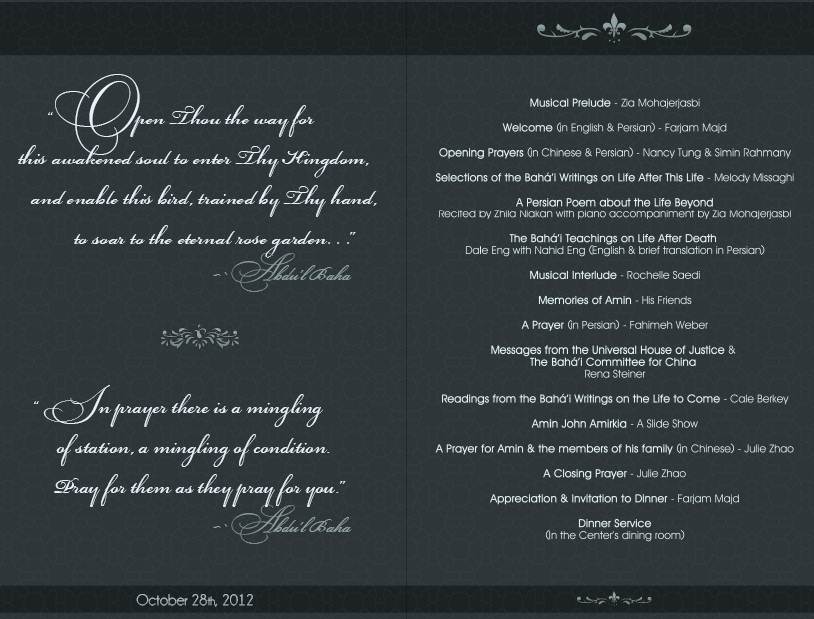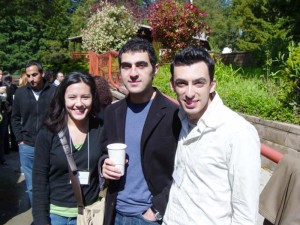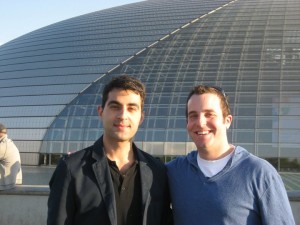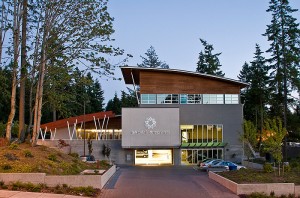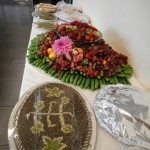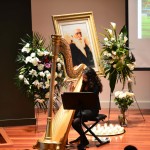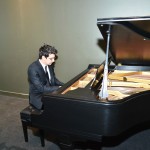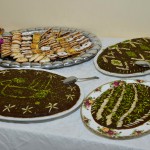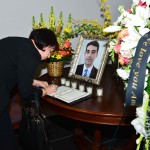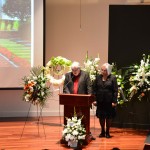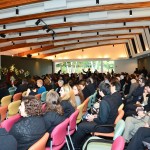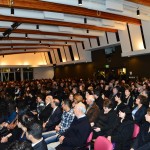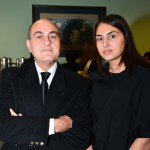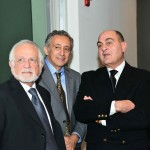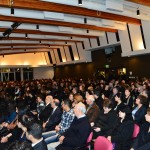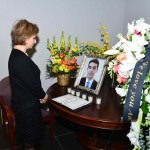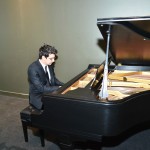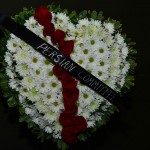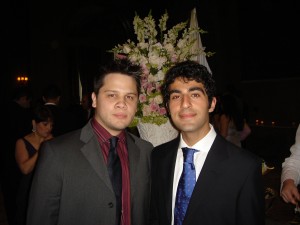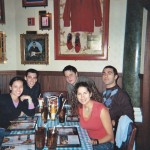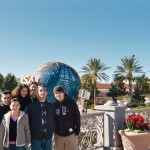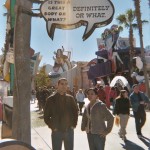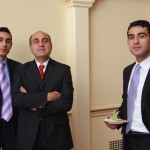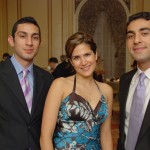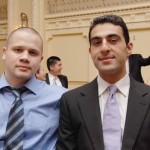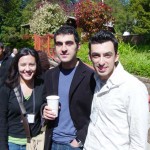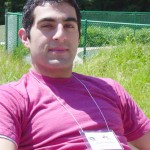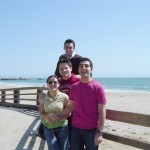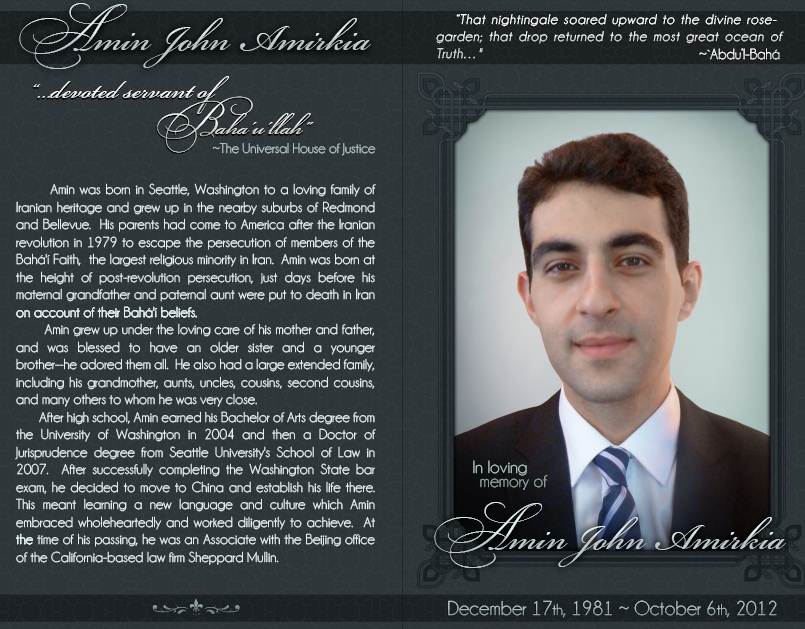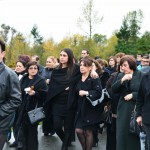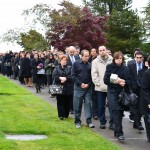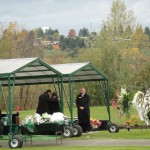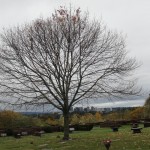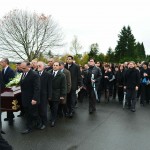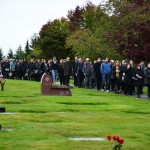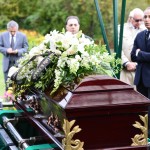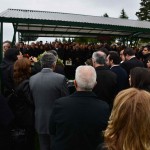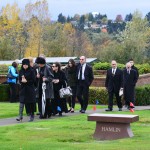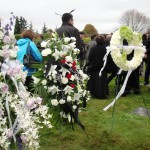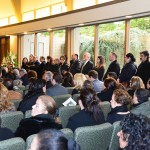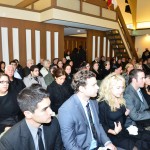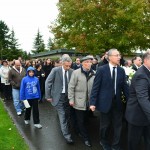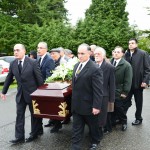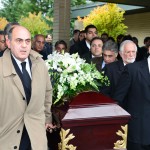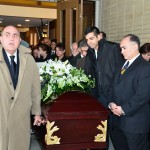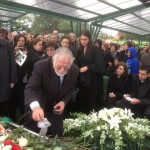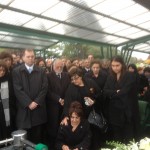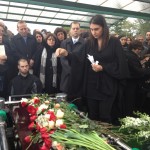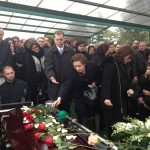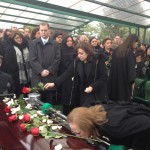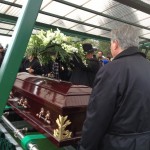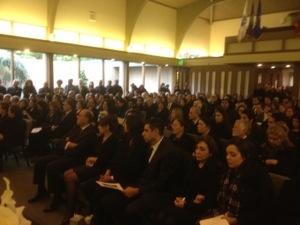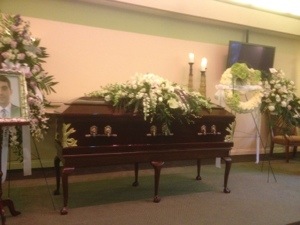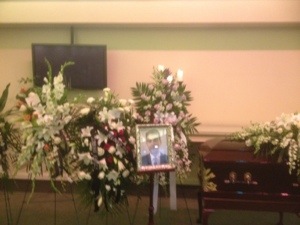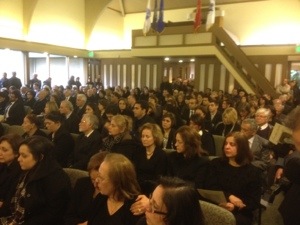Comments by Dale Eng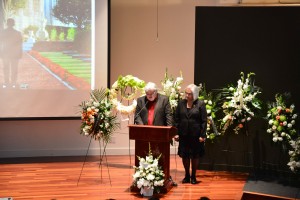 shared at Amin’s Memorial @ the Eastside Bahá’í Center on 10/28/12
shared at Amin’s Memorial @ the Eastside Bahá’í Center on 10/28/12
Dearest Family and Friends of Amin,
This crowded room testifies to how greatly dear Amin is loved. How seldom it is that we have the blessing of knowing someone like Amin who inspires such universal affection!
I want to acknowledge up-front there is little, if anything, that can be said to lessen our sense of missing Amin — and we know his physical absence is all the more difficult for his family members, who are also so very dear to us.
Today’s Memorial is a special time for remembering Amin and to celebrate his life — to admire his wonderful qualities, his numerous accomplishments, his exemplary character, and his spiritual way of living that was dedicated to making this world a better place.
The passing of a loved one naturally makes us think about that person’s life. It also makes us think of life in general, and about our own lives — to ponder why are we in this world, and what are we doing about it? As a devoted follower of that way of life known as the Bahá’í Faith–which is based on the beautiful teachings of Bahá’u’lláh–Amin had clear ideas about life’s purposes, and he was dedicated to realizing them. Amin knew why he was in this world, and what he needed to do while here.
Bahá’u’lláh says life has two fundamental purposes, one is collective and relates to every one of us as members of the human race; the other purpose is personal and involves each individual’s development and growth as a spiritual being.
Bahá’u’lláh explains that, collectively, “All men have been created to carry forward an ever-advancing civilization.” To support this process of advancing civilization, God has progressively sent a series of Divine Teachers Who revealed social and spiritual lessons for the periods and places in which Each appeared. Their teachings have enabled people everywhere to form ever-widening circles of unity. Now, when humanity stands at the threshold of its long-awaited collective maturity, Bahá’u’lláh teaches that: “The gift of God to this enlightened age is the knowledge of the oneness of mankind and of the fundamental oneness of religion.” He says, “The earth is but one country, and mankind its citizens.” As a Bahá’í, Amin sought to contribute towards breaking down prejudices and promoting oneness and unity between peoples — these principles are what motivated his moving to China and learning its language and culture.
As for life’s individual purpose of growing as a spiritual being, the Bahá’í teachings liken this world to a classroom for our souls — it is a place to learn about, acquire, and practice spiritual qualities. This process of developing as a spiritual being was a daily endeavor for Amin, it was why he was so clean, loving, and righteous. Though he knew having a healthy physical body was important, as a Bahá’í Amin believed what was most important was giving time, effort, and attention to nurturing his soul, his true reality.
In one of His most well-known Writings, read at the beginning of our program this afternoon, Bahá’u’lláh says God has “… made death a messenger of joy”. In trying to understand how death could bring joy, consider this response by ‘Abdu’l-Bahá, Bahá’u’lláh’s Son, when He was asked, “How should one look forward to death?” He replied: “How does one look forward to the goal of any journey? With hope and with expectation. It is even so with the end of this earthly journey.” On another occasion ‘Abdu’l-Bahá explained: “To consider that after the death of the body the spirit perishes is like imagining that a bird in a cage will be destroyed if the cage is broken, though the bird has nothing to fear from the destruction of the cage. Our body is like the cage, and the spirit is like the bird.”
Bahá’ís view the next life, then, as a natural continuation of the life that begins in this world. Bahá’u’lláh explains that for humans death is not a state of termination but a process of transition; death is not an ending, but a new and wondrous beginning to a far greater existence. Bahá’u’lláh speaks of countless, glorious, spiritual realms created by God which exist beyond this mortal plane, worlds in which our souls “undergo a spiritual development that extends throughout eternity”.
In explaining the life to come, Bahá’u’lláh uses a fascinating analogy, saying: “The world beyond is as different from this world as this world is different from that of the child while still in the womb of its mother.” As we ponder this comparison, we know this world is certainly much greater than the world of the womb, and we’ve all experienced the joy of welcoming a child to this world after it leaves the womb! To think that the world beyond is likewise so very marvelously and positively different from this world, then we can begin to understand why transitioning onto God’s great realms beyond should indeed also be a cause for joy.
‘Abdu’l-Bahá further explained this comparison of worlds in this way: “These human conditions may be likened to the matrix of the mother from which a child is to be born into the spacious outer world. At first the infant finds it very difficult to reconcile itself to its new existence. It cries as if not wishing to be separated from its narrow abode and imagining that life is restricted to that limited space. It is reluctant to leave its home, but nature forces it into this world. Having come into its new conditions, it finds that it has passed from darkness into a sphere of radiance; from gloomy and restricted surroundings it has been transferred to a spacious and delightful environment. Its nourishment was the blood of the mother; now it finds delicious food to enjoy. Its new life is filled with brightness and beauty; it looks with wonder and delight upon the mountains, meadows and fields of green, the rivers and fountains, the wonderful stars; it breathes the life-quickening atmosphere; and then it praises God for its release from the confinement of its former condition and attainment to the freedom of a new realm. This analogy,” ‘Abdu’l-Bahá says, “expresses the relation of the temporal world to the life hereafter—the transition of the soul of man from darkness and uncertainty to the light and reality of the eternal Kingdom.”
Of course, if we could somehow explain to an embryo what this world outside the womb is like, and why that little one must prepare arms, legs, and sensory organs, it could never understand our explanations—because before birth it has no terms of reference to help it understand the benefits of limbs and senses. But after being born and using its facilities, their benefits would be clear and obvious. Likewise, the Bahá’í Writings tell us that while we are in this world we cannot even begin to “picture our state in the next world. All we know is that our consciousness, our personality, endures in some new state, and that that world is as much better than this one as this one is better than the dark womb of our mother…”.
And just as children in the womb develop whatever they need to properly function in this world, Bahá’u’lláh says in this existence we must prepare certain spiritual faculties needed for God’s realms hereafter—and these are those attributes which God’s Prophets have all stressed: spiritual qualities such as mercy, kindness, love, compassion, generosity, forgiveness, and every other Divine characteristic associated with our Creator.
As we grasp the concepts underlying Bahá’u’lláh’s teachings regarding the preparatory purpose of this life, and how living here is part of a natural process of becoming ready for the life to come, then death will not only “lose its sting”, but it can actually make us “welcome [death] as a gate-way to a realm immeasurably higher and nobler than this home of suffering we call our earth.”
To the parents of a young man who had passed on, ‘Abdu’l-Bahá wrote: “O ye two patient souls! Your letter was received. The death of that beloved youth and his separation from you have caused the utmost sorrow and grief; for he winged his flight in the flower of his age and the bloom of his youth to the heavenly nest. But he hath been freed from this sorrow-stricken shelter and hath turned his face toward the everlasting nest of the Kingdom, and, being delivered from a dark and narrow world, hath hastened to the sanctified realm of light; therein lieth the consolation of our hearts.
“The inscrutable divine wisdom underlieth such heart-rending occurrences. It is as if a kind gardener transferreth a fresh and tender shrub from a confined place to a wide open area. This transfer is not the cause of the withering, the lessening or the destruction of that shrub; nay, on the contrary, it maketh it to grow and thrive, acquire freshness and delicacy, become green and bear fruit. This hidden secret is well known to the gardener, but those souls who are unaware of this bounty suppose that the gardener, in his anger and wrath, hath uprooted the shrub. Yet to those who are aware, this concealed fact is manifest, and this predestined decree is considered a bounty. Do not feel grieved or disconsolate, therefore, at the ascension of that bird of faithfulness; nay, under all circumstances pray for that youth, supplicating for him forgiveness and the elevation of his station.”
Indeed, Bahá’u’lláh tell us that, “… were we to have the proper vision to see the blessings of the other world we would not bear to endure one more hour of existence upon the earth. The reason why we are deprived of that vision is because otherwise no one would care to remain and the whole fabric of society will be destroyed.”
Regarding what happens to the soul at the death of the body, the Bahá’í Writings explain: “When man dies, his relation with the body ceases. [For example,] The sun is reflected in the mirror; the mirror reflects the light and brilliancy of the sun, but the sun does not reside in the mirror. It does not enter nor come out of the mirror, nevertheless one sees it in the mirror, so [in the same way] the soul reflects itself in the body. If the mirror [is] broken the sun does not die. The body is [like] the temporary mirror; the spiritual soul suffers no change, no more than the sun does, remaining eternally in its own station. Even as in the world of dreams when all the physical faculties are in abeyance and the soul travels in all realms seeing, hearing, speaking, so when the physical body decomposes, the soul is not affected.”
I’d like to conclude this brief sharing of Bahá’u’lláh’s teachings regarding the soul and its eternal journey throughout God’s realms by citing a few more selections from the Bahá’í Sacred Writings on life after this life. As I read, I hope you will keep Amin’s in mind, for it was these Words, and others like them, that brightened — and which surely continue to illumine — his radiant soul:
“Thou hast asked Me concerning the nature of the soul. Know, verily, that the soul is a sign of God, a heavenly gem whose reality the most learned of men hath failed to grasp, and whose mystery no mind, however acute, can ever hope to unravel. It is the first among all created things to declare the excellence of its Creator, the first to recognize His glory, to cleave to His truth, and to bow down in adoration before Him. If it be faithful to God, it will reflect His light, and will, eventually, return unto Him.”
“Consider how a being, in the world of the womb, was deaf of ear and blind of eye, and mute of tongue; how he was bereft of any perceptions at all. But once, out of that world of darkness, he passed into this world of light, then his eye saw, his ear heard, his tongue spoke. In the same way, once he hath hastened away from this mortal place into the Kingdom of God, then he will be born in the spirit; then the eye of his perception will open, the ear of his soul will hearken, and all the truths of which he was ignorant before will be made plain and clear.”
“ … physical life, in comparison with eternal life in the Kingdom, is considered as death. So Christ called the physical life death, and said: ‘Let the dead bury their dead.’ Though those souls possessed physical life, yet in His eyes that life was death.”
“Divine perfection is infinite, therefore the progress of the soul is also infinite. From the very birth of a human being the soul progresses, the intellect grows and knowledge increases. When the body dies the soul lives on. All the differing degrees of created physical beings are limited, but the soul is limitless!”
“Do not grieve on account of the death of thy son, neither sigh nor lament. That nightingale soared upward to the divine rose-garden; that drop returned to the most great ocean of Truth; that foreigner hastened to his native abode; and that ill one found salvation and life eternal. Why should thou be sad and heartbroken? This separation is temporal; this remoteness and sorrow is counted only by days. Thou shalt find him in the Kingdom of God and thou wilt attain to the everlasting union. Physical companionship is ephemeral, but heavenly association is eternal. Whenever thou rememberest the eternal and never ending union, thou wilt be comforted and blissful.”
